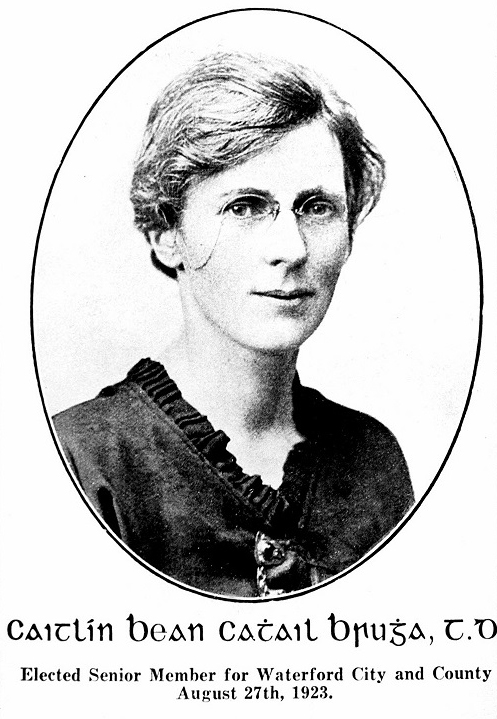Children starving because of political imprisonments, Waterford public meeting is told
Waterford, 18 September 1923 - There are hundreds of children starving in Dublin because the Free State Government has locked up their fathers and deprived their families of a vital means of support.
That was the message delivered to a public meeting in Waterford on the 17th of September by the newly-elected TD for the city, Mrs. Caitlín Brugha, who said that she knew of homes in Dublin where there was not a chair to sit, as all the furniture had been pawned or sold to buy bread.
Relatives of imprisoned men were left relying on charity for survival and it was up to every Irishman and woman to ensure that this did not continue. To cheers, Mrs. Brugha declared that while everyone wished for peace, there would be no peace in Ireland until the prisoners were released.
Mrs. Brugha further noted that of the 44 anti-Treaty Republican TDs returned at the recent election, 27 were in prison and 6 were on the run. This meant that republican voters were being penalised and their views not fairly represented.
It is therefore significant that the demonstration in Waterford was just one of a series held throughout the country at which resolutions were passed demanding the release of prisoners. Similar demonstrations are reported to have been held in Cork, Cavan, Dun Laoghaire, Mohill, Mullingar, Nenagh, Portlaoise, Tralee, Kilmallock and Limerick City.
A meeting in Cork, presided over by Mr. F. Daly, the chairman of the Cork Harbour Board, also demanded the release of prisoners in the ‘north’ and in Great Britain. In a letter read to the Cork gathering by Mr. M. O’Cuill, the Chairman of Cork U.D.C. claimed that political differences over the treaty could be settled peacefully if the Government agreed to order the release of political prisoners and brought an end to aggressive actions against opponents who were at large, and if Republican TDs pledged themselves to lend no countenance to civil war or armed strife into the future.
The issue of prisoner releases was also raised at an ordinary meeting of Dublin Corporation, though the absence of a quorum meant that a resolution in the name of Councillor O’Flanagan was never heard. The resolution stated that all persons, interned or otherwise, for what were considered to be political offences, ought to be set free at once.
[Editor's note: This is an article from Century Ireland, a fortnightly online newspaper, written from the perspective of a journalist 100 years ago, based on news reports of the time.]





















